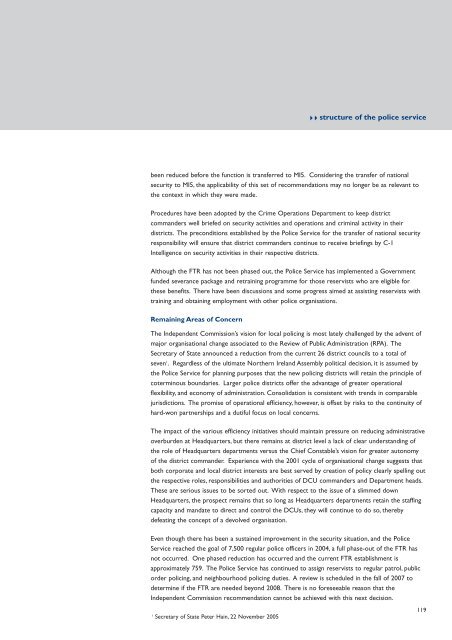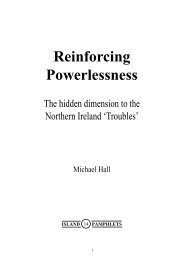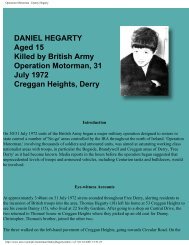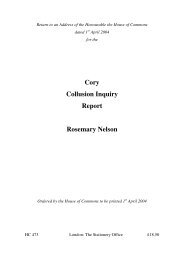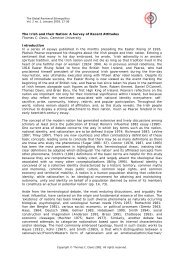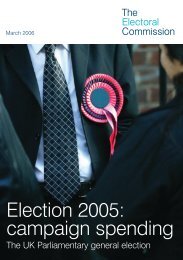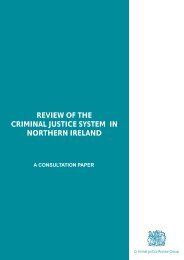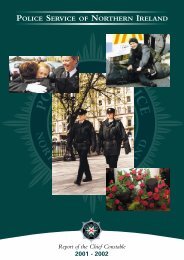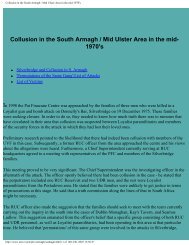11293 report 19 - CAIN - University of Ulster
11293 report 19 - CAIN - University of Ulster
11293 report 19 - CAIN - University of Ulster
You also want an ePaper? Increase the reach of your titles
YUMPU automatically turns print PDFs into web optimized ePapers that Google loves.
structure <strong>of</strong> the police servicebeen reduced before the function is transferred to MI5. Considering the transfer <strong>of</strong> nationalsecurity to MI5, the applicability <strong>of</strong> this set <strong>of</strong> recommendations may no longer be as relevant tothe context in which they were made.Procedures have been adopted by the Crime Operations Department to keep districtcommanders well briefed on security activities and operations and criminal activity in theirdistricts. The preconditions established by the Police Service for the transfer <strong>of</strong> national securityresponsibility will ensure that district commanders continue to receive briefings by C-1Intelligence on security activities in their respective districts.Although the FTR has not been phased out, the Police Service has implemented a Governmentfunded severance package and retraining programme for those reservists who are eligible forthese benefits. There have been discussions and some progress aimed at assisting reservists withtraining and obtaining employment with other police organisations.Remaining Areas <strong>of</strong> ConcernThe Independent Commission’s vision for local policing is most lately challenged by the advent <strong>of</strong>major organisational change associated to the Review <strong>of</strong> Public Administration (RPA). TheSecretary <strong>of</strong> State announced a reduction from the current 26 district councils to a total <strong>of</strong>seven 1 . Regardless <strong>of</strong> the ultimate Northern Ireland Assembly political decision, it is assumed bythe Police Service for planning purposes that the new policing districts will retain the principle <strong>of</strong>coterminous boundaries. Larger police districts <strong>of</strong>fer the advantage <strong>of</strong> greater operationalflexibility, and economy <strong>of</strong> administration. Consolidation is consistent with trends in comparablejurisdictions. The promise <strong>of</strong> operational efficiency, however, is <strong>of</strong>fset by risks to the continuity <strong>of</strong>hard-won partnerships and a dutiful focus on local concerns.The impact <strong>of</strong> the various efficiency initiatives should maintain pressure on reducing administrativeoverburden at Headquarters, but there remains at district level a lack <strong>of</strong> clear understanding <strong>of</strong>the role <strong>of</strong> Headquarters departments versus the Chief Constable’s vision for greater autonomy<strong>of</strong> the district commander. Experience with the 2001 cycle <strong>of</strong> organisational change suggests thatboth corporate and local district interests are best served by creation <strong>of</strong> policy clearly spelling outthe respective roles, responsibilities and authorities <strong>of</strong> DCU commanders and Department heads.These are serious issues to be sorted out. With respect to the issue <strong>of</strong> a slimmed downHeadquarters, the prospect remains that so long as Headquarters departments retain the staffingcapacity and mandate to direct and control the DCUs, they will continue to do so, therebydefeating the concept <strong>of</strong> a devolved organisation.Even though there has been a sustained improvement in the security situation, and the PoliceService reached the goal <strong>of</strong> 7,500 regular police <strong>of</strong>ficers in 2004, a full phase-out <strong>of</strong> the FTR hasnot occurred. One phased reduction has occurred and the current FTR establishment isapproximately 759. The Police Service has continued to assign reservists to regular patrol, publicorder policing, and neighbourhood policing duties. A review is scheduled in the fall <strong>of</strong> 2007 todetermine if the FTR are needed beyond 2008. There is no foreseeable reason that theIndependent Commission recommendation cannot be achieved with this next decision.1Secretary <strong>of</strong> State Peter Hain, 22 November 20051<strong>19</strong>


